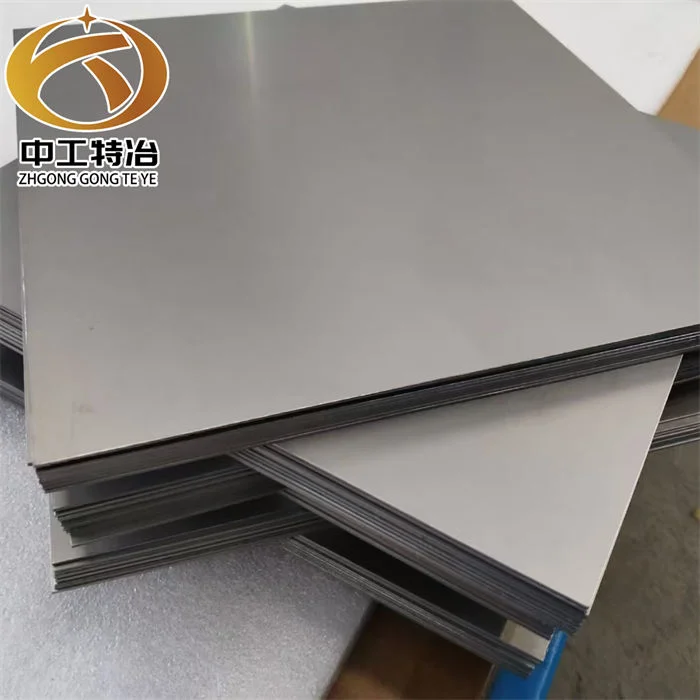Why 321 Stainless Steel Plate Is the Preferred Choice for High-Heat and Corrosive Environments
Stainless steel is an indispensable material in various industries due to its excellent corrosion resistance, durability, and versatility. Among the numerous stainless steel grades available, 321 stainless steel plate stands out as an ideal solution for applications that demand superior resistance to high-temperature oxidation and intergranular corrosion. In this article, Zhonggongte Metallurgical will explore the unique properties of 321 stainless steel plates, emphasizing why this material is favored in critical sectors such as aerospace, chemical processing, and manufacturing.
What is 321 Stainless Steel Plate?

321 stainless steel is a titanium-stabilized austenitic stainless steel alloy. It is widely recognized for its excellent resistance to corrosion, particularly in high-temperature environments. The addition of titanium helps to reduce the risk of intergranular corrosion, which is a common concern in other stainless steel grades. 321 stainless steel is essentially similar to 304 stainless steel in terms of its mechanical properties but offers enhanced performance at elevated temperatures and in aggressive environments. The titanium content in 321 stainless steel binds with carbon to form titanium carbide, which prevents the formation of chromium carbides at grain boundaries. This property makes 321 stainless steel an excellent choice for applications involving high temperatures or where there is a risk of carbide precipitation.
Key Properties of 321 Stainless Steel Plate
The 321 stainless steel plate is highly regarded for its excellent properties, which make it the material of choice for industries that require high strength, corrosion resistance, and reliable performance in high-temperature environments. Below are some of the key properties that contribute to the popularity of 321 stainless steel plate in demanding applications:
1. High-Temperature Resistance
321 stainless steel plate is specifically designed to perform well in high-temperature applications. It exhibits outstanding resistance to oxidation and scaling, withstanding temperatures up to 870°C (1600°F) in intermittent service and up to 925°C (1700°F) in continuous service. This makes 321 stainless steel plate an ideal material for industries such as aerospace, automotive, and chemical processing, where components are exposed to elevated temperatures and thermal cycling.
The alloy's high-temperature performance ensures it maintains its structural integrity, strength, and corrosion resistance even when subjected to extreme heat, making it suitable for high-stress environments where other materials might degrade. This property is especially crucial in applications like exhaust systems, heat exchangers, and furnace components.
2. Corrosion Resistance
One of the standout features of 321 stainless steel plate is its excellent resistance to corrosion, particularly in environments where thermal cycling or exposure to corrosive chemicals is common. The addition of titanium to the alloy helps stabilize the structure, significantly reducing the risk of intergranular corrosion. This stabilizing effect makes 321 stainless steel plate more resistant to damage from high-temperature corrosive environments than other austenitic stainless steels like 304 stainless steel, which is more prone to intergranular corrosion.
This high resistance to corrosion makes 321 stainless steel plate a valuable choice for industries such as chemical processing, power generation, and marine applications, where parts are often exposed to aggressive environments, including acids and high levels of heat.
3. Mechanical Strength
321 stainless steel plate maintains excellent mechanical strength even at elevated temperatures, making it suitable for structural applications where high strength is a priority. It is designed to retain its strength under extreme conditions, while also offering good oxidation resistance. The 321 stainless steel plate also exhibits excellent ductility and formability, which means it can be easily shaped, fabricated, and welded into complex shapes and designs without compromising its strength.
This combination of strength, ductility, and resistance to oxidation makes 321 stainless steel plate a preferred material for applications such as structural components, pressure vessels, and welded assemblies that require high performance under stress.
4. Weldability
One of the key advantages of 321 stainless steel plate is its exceptional weldability. Thanks to the titanium content, which stabilizes the grain structure,321 stainless steel plate can be welded without the need for post-weld heat treatment. The titanium content in the alloy helps to prevent the formation of harmful carbides in the heat-affected zone during welding, thereby reducing the risk of carbide precipitation.
As a result,321 stainless steel plate provides strong, durable welds, even in high-stress environments, making it a great choice for applications requiring robust, high-quality welds. This property is essential in industries like construction, aerospace, and automotive, where welded joints must maintain integrity under challenging conditions.
321 stainless steel plates are an excellent choice for a wide range of industries requiring materials with high-temperature resistance, excellent corrosion resistance, and good mechanical properties. Whether you're in the aerospace, chemical processing, or food and beverage industry, 321 stainless steel provides a reliable solution that ensures long-lasting performance even in the harshest environments. By understanding the properties, applications, and advantages of this versatile material, you can make informed decisions and select the right 321 stainless steel plate for your needs. Incorporating 321 stainless steel into your designs and manufacturing processes can lead to enhanced durability, reduced maintenance costs, and improved efficiency.
https://www.zhonggongtemetal.com/321-Stainless-Steel-Plate.html
www.zhonggongtemetal.com
Jiangsu Zhonggongte Metallurgical Technology Co., Ltd.